人教新目标(Go for it)版九年级全册Unit 10 You're supposed to shake hands.词汇学习课件(共28张PPT)
文档属性
| 名称 | 人教新目标(Go for it)版九年级全册Unit 10 You're supposed to shake hands.词汇学习课件(共28张PPT) |

|
|
| 格式 | pptx | ||
| 文件大小 | 1.2MB | ||
| 资源类型 | 教案 | ||
| 版本资源 | 人教新目标(Go for it)版 | ||
| 科目 | 英语 | ||
| 更新时间 | 2024-05-07 00:00:00 | ||
图片预览

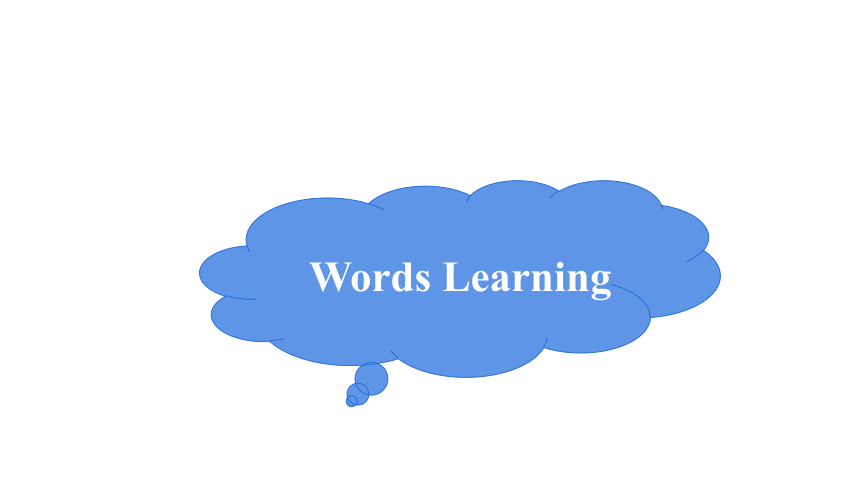
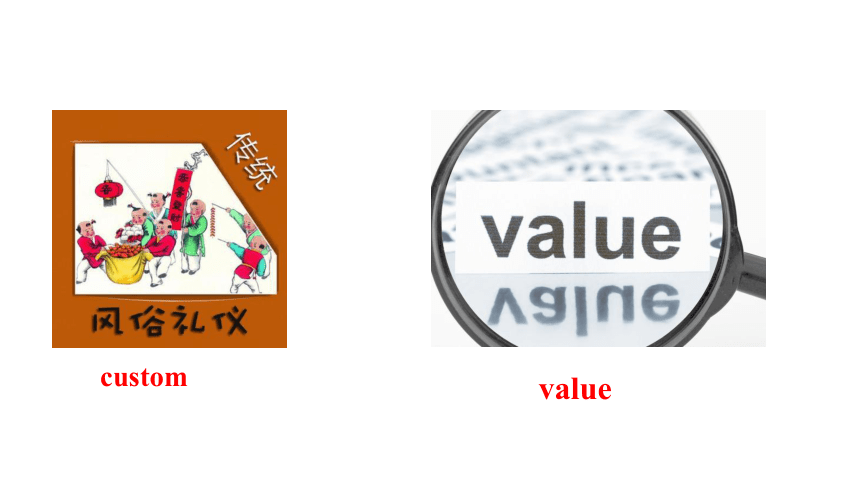
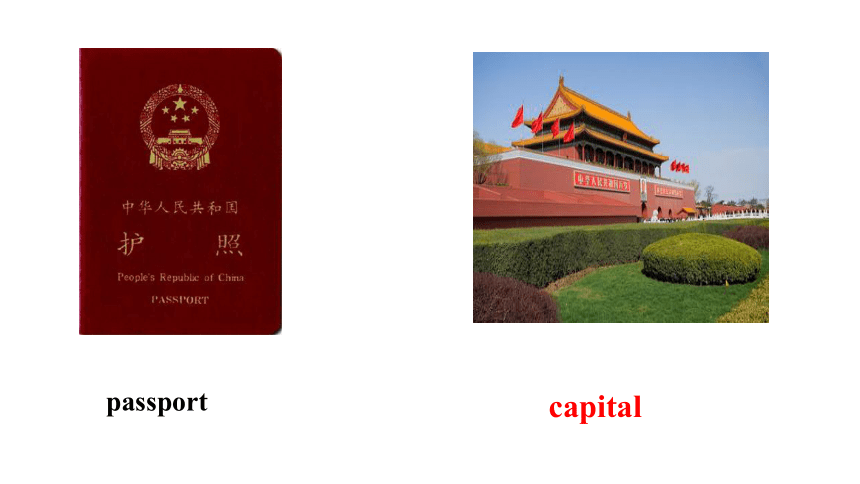
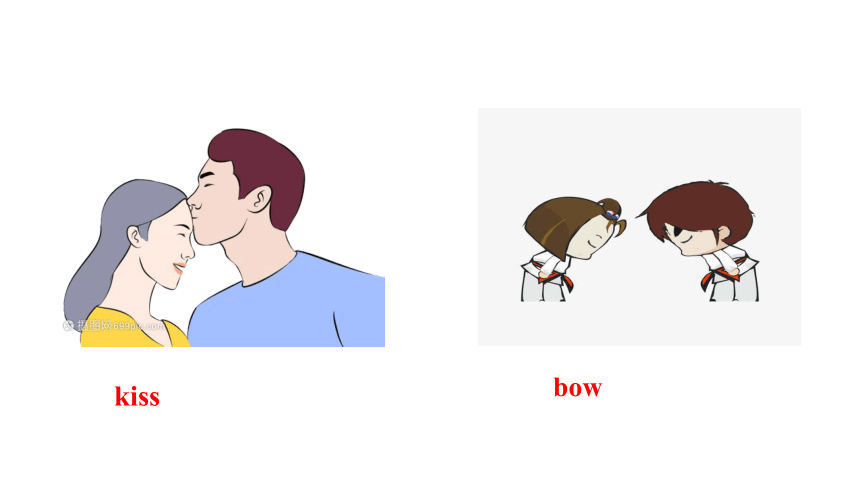
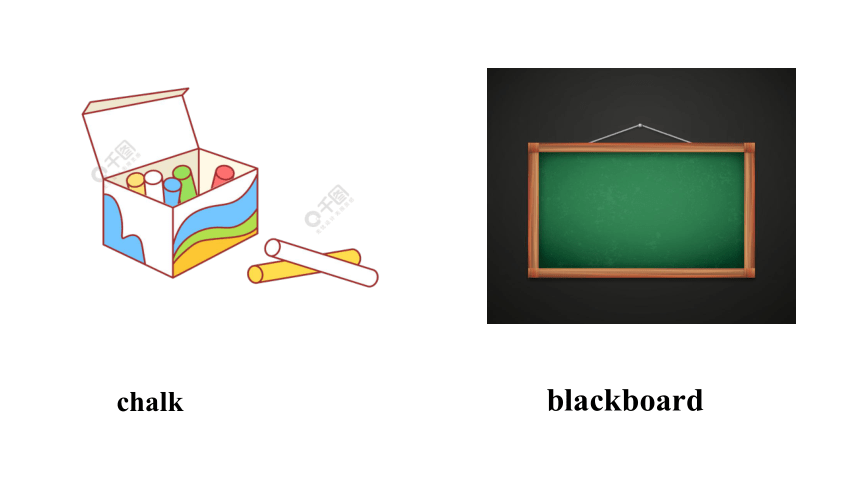
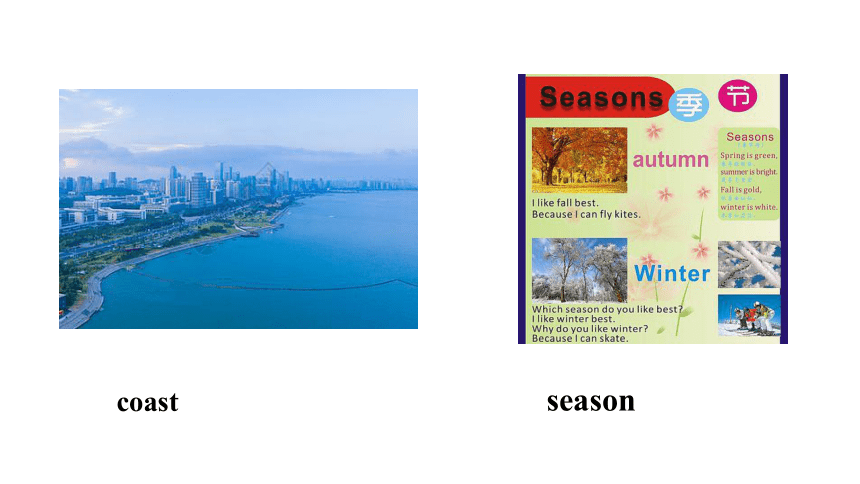
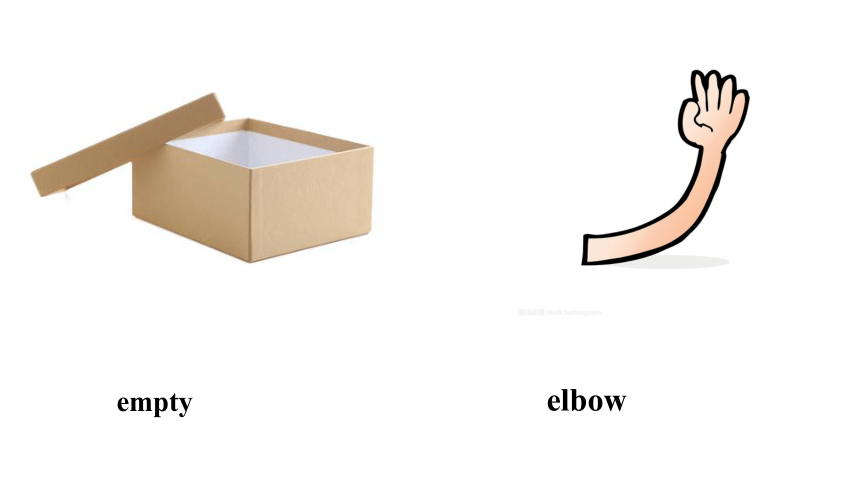

文档简介
(共28张PPT)
Unit 10
词汇学习
新目标Go For It 九年级英语全一册
Words Learning
custom
value
passport
capital
kiss
bow
chalk
blackboard
coast
season
empty
elbow
Words Review
drop by
get mad
take off
get used to
Exercises
Match
kiss
value
custom
capital
coast
season
海岸
亲吻
季节
价值
风俗
首都
Match
粉笔
空的
护照
胳膊
鞠躬
放松的
elbow
relaxed
bow
empty
passport
chalk
Match
drop by
make an effort
take off
make...feel at home
go out of one’s way
get used to
使感到宾至如归
格外努力
习惯于
顺便到访
做出努力
脱下
Match
大动肝火
毕竟
北海岸
把......擦掉
打招呼
交换生
northern coast
clean...off
get mad
greet sb.
after all
exchage student
Ⅲ. 根据对话内容选择恰当的选项补全对话。
A: Hello, Susan, I hear you are leaving for France. (1)________
B: Not really because I don’t know a lot about customs in France.
A: Oh, different countries have different customs. (2)_______ I can tell you some customs there.
B: Great! What should I not do at the dinner table
A. What else B. I used to stay in France.
C. Why are you so surprised D. You must be excited about it.
E. I gave you a book about the culture of the country.
F. You are not supposed to put your bread on your plate.
G. The last one, it's polite to eat everything that's put on your plate.
D
B
A: (3) _______
B: Where should I put it
A: You should put it on the table!
B: Oh, that’s pretty strange. We never put food on the table in our country.
A: Yeah. And you shouldn’t serve any drinks before all guests have arrived — even if some are an hour or more late!
B: Well, I see. (4) ________
F
A. What else B. I used to stay in France.
C. Why are you so surprised D. You must be excited about it.
E. I gave you a book about the culture of the country.
F. You are not supposed to put your bread on your plate.
G. The last one, it's polite to eat everything that's put on your plate.
A
A: You shouldn’t start eating until your hosts say bon appétit. It’s what the French say before starting to eat a meal.
B: I see.
A: (5)________
B: Good. Thank you for telling me so much.
G
A. What else
B. I used to stay in France.
C. Why are you so surprised
D. You must be excited about it.
E. I gave you a book about the culture of the country.
F. You are not supposed to put your bread on your plate.
G. The last one, it's polite to eat everything that's put on your plate.
Ⅰ. 根据句意及提示,补全所缺单词。
1. Everyone went to the farm e me yesterday. I did my homework at home.
2. My uncle’s daughter is my grandmother’s g .
3. There is nothing in the house. It is e .
4. He b badly at school yesterday. He fought with other students.
5. I bought a black jacket yesterday but now I want to e it for a blue one.
6. Listening, speaking, reading and writing are b skills in English learning.
except
granddaughter
empty
behaved
exchange
basic
Ⅱ. 根据汉语意思完成英语句子。
1. 你们微笑的脸庞让我有一种宾至如归的感觉。
Your smiling faces _______ _______ _______ _______ _______.
2. 刚才那个男孩把叉子插到一个土豆中闹着玩。
Just now the boy _______ a fork _______ a potato for fun.
3. 她被邀请了,但是没有露面。
She was invited, but she didn’t _______ _______.
make me feel
at home
stuck into
show
up
4. 他指着桌子上的物体,问:“那是什么?”
He is _______ _______ the object on the table asking, “What's that ”.
5. 我敲门了,可是没有人回应。
I _______ _______ _______ _______, but nobody answered.
6. 起初我觉得这里太热,不过很快就习惯了。
At first, I felt it was hot here but I _______ _______ _______ it quickly.
pointing at
knocked at the door
got
used to
7. 虽然我不擅长做饭,可是我妈妈生日那天我特地给她做了长寿面。
Although I’m not good at cooking but I _______ _______ _______ _______ _______ to make long noodles for Mom on her birthday.
8. 我猜想她和我年龄相仿。
I guess she is _______ _______ _______.
went out of my way
about my age
根据短文内容,从方框中选择恰当单词填空。
suggest, exchange, greet, noon, get mad, gradually, custom, knock, drop by, behave
“When in Rome, do as the Romans do.” tells us there’re different (1) _________ in different places. After coming to America, the use of “yes” and “no” brings me a lot of trouble, because the use in Korean is different from that in English. For example, in America, at (2) _______ if I’m asked, “Haven’t you had lunch yet ” and I haven’t had lunch yet,
customs
noon
suggest, exchange, greet, noon, get mad, gradually, custom, knock, drop by, behave
we Koreans usually say, “Yes, I haven’t.” But in English, I must say, “No, I haven’t.” Because of this, my friends often misunderstood (误解) me.
Here is an example. Last year I went to America as a(n) (3) __________ student. On the first day, I (4) _______ my American friend, Bob. He asked some questions and I answered.
exchange
greeted
suggest, exchange, greet, noon, get mad, gradually, custom, knock, drop by, behave
Several days later, someone said I came from North Korea. I (5)_________ when I heard it. I (6)____________ Bob’s room and asked why he spread the wrong information. “Oh, you told me that. Don’t you remember ” he said. “When I asked you, ‘You are not from North Korea, are you ’ you clearly answered, ‘Yes, of course.’ It means that you’re from North Korea, yes ”
got mad
dropped by
suggest, exchange, greet, noon, get mad, gradually, custom, knock, drop by, behave
Here is another example. One Sunday night, my roommate Mark brought his brother into the dorm (宿舍). That boy kept (7)________ on the table. Mark asked me, “Isn’t my brother noisy Doesn’t it make you uncomfortable ” I didn’t mind the noise, so I said “Yes!” Then I saw Mark (8)_______ strangely. He said, “Sorry!” I couldn’t understand what he was sorry for, and just said, “OK.”
knocking
behave
suggest, exchange, greet, noon, get mad, gradually, custom, knock, drop by, behave
Then I realized how stupid I was. That evening, I explained it to Mark and said sorry. (9)___________, I know how to deal with such problems. Here are my (10)__________: First, take a five-second break if you are not sure of “yes” or “no”. Second, use “pardon me”, so the person may explain to you in a direct way.
Gradually
suggestions
Unit 10
词汇学习
新目标Go For It 九年级英语全一册
Words Learning
custom
value
passport
capital
kiss
bow
chalk
blackboard
coast
season
empty
elbow
Words Review
drop by
get mad
take off
get used to
Exercises
Match
kiss
value
custom
capital
coast
season
海岸
亲吻
季节
价值
风俗
首都
Match
粉笔
空的
护照
胳膊
鞠躬
放松的
elbow
relaxed
bow
empty
passport
chalk
Match
drop by
make an effort
take off
make...feel at home
go out of one’s way
get used to
使感到宾至如归
格外努力
习惯于
顺便到访
做出努力
脱下
Match
大动肝火
毕竟
北海岸
把......擦掉
打招呼
交换生
northern coast
clean...off
get mad
greet sb.
after all
exchage student
Ⅲ. 根据对话内容选择恰当的选项补全对话。
A: Hello, Susan, I hear you are leaving for France. (1)________
B: Not really because I don’t know a lot about customs in France.
A: Oh, different countries have different customs. (2)_______ I can tell you some customs there.
B: Great! What should I not do at the dinner table
A. What else B. I used to stay in France.
C. Why are you so surprised D. You must be excited about it.
E. I gave you a book about the culture of the country.
F. You are not supposed to put your bread on your plate.
G. The last one, it's polite to eat everything that's put on your plate.
D
B
A: (3) _______
B: Where should I put it
A: You should put it on the table!
B: Oh, that’s pretty strange. We never put food on the table in our country.
A: Yeah. And you shouldn’t serve any drinks before all guests have arrived — even if some are an hour or more late!
B: Well, I see. (4) ________
F
A. What else B. I used to stay in France.
C. Why are you so surprised D. You must be excited about it.
E. I gave you a book about the culture of the country.
F. You are not supposed to put your bread on your plate.
G. The last one, it's polite to eat everything that's put on your plate.
A
A: You shouldn’t start eating until your hosts say bon appétit. It’s what the French say before starting to eat a meal.
B: I see.
A: (5)________
B: Good. Thank you for telling me so much.
G
A. What else
B. I used to stay in France.
C. Why are you so surprised
D. You must be excited about it.
E. I gave you a book about the culture of the country.
F. You are not supposed to put your bread on your plate.
G. The last one, it's polite to eat everything that's put on your plate.
Ⅰ. 根据句意及提示,补全所缺单词。
1. Everyone went to the farm e me yesterday. I did my homework at home.
2. My uncle’s daughter is my grandmother’s g .
3. There is nothing in the house. It is e .
4. He b badly at school yesterday. He fought with other students.
5. I bought a black jacket yesterday but now I want to e it for a blue one.
6. Listening, speaking, reading and writing are b skills in English learning.
except
granddaughter
empty
behaved
exchange
basic
Ⅱ. 根据汉语意思完成英语句子。
1. 你们微笑的脸庞让我有一种宾至如归的感觉。
Your smiling faces _______ _______ _______ _______ _______.
2. 刚才那个男孩把叉子插到一个土豆中闹着玩。
Just now the boy _______ a fork _______ a potato for fun.
3. 她被邀请了,但是没有露面。
She was invited, but she didn’t _______ _______.
make me feel
at home
stuck into
show
up
4. 他指着桌子上的物体,问:“那是什么?”
He is _______ _______ the object on the table asking, “What's that ”.
5. 我敲门了,可是没有人回应。
I _______ _______ _______ _______, but nobody answered.
6. 起初我觉得这里太热,不过很快就习惯了。
At first, I felt it was hot here but I _______ _______ _______ it quickly.
pointing at
knocked at the door
got
used to
7. 虽然我不擅长做饭,可是我妈妈生日那天我特地给她做了长寿面。
Although I’m not good at cooking but I _______ _______ _______ _______ _______ to make long noodles for Mom on her birthday.
8. 我猜想她和我年龄相仿。
I guess she is _______ _______ _______.
went out of my way
about my age
根据短文内容,从方框中选择恰当单词填空。
suggest, exchange, greet, noon, get mad, gradually, custom, knock, drop by, behave
“When in Rome, do as the Romans do.” tells us there’re different (1) _________ in different places. After coming to America, the use of “yes” and “no” brings me a lot of trouble, because the use in Korean is different from that in English. For example, in America, at (2) _______ if I’m asked, “Haven’t you had lunch yet ” and I haven’t had lunch yet,
customs
noon
suggest, exchange, greet, noon, get mad, gradually, custom, knock, drop by, behave
we Koreans usually say, “Yes, I haven’t.” But in English, I must say, “No, I haven’t.” Because of this, my friends often misunderstood (误解) me.
Here is an example. Last year I went to America as a(n) (3) __________ student. On the first day, I (4) _______ my American friend, Bob. He asked some questions and I answered.
exchange
greeted
suggest, exchange, greet, noon, get mad, gradually, custom, knock, drop by, behave
Several days later, someone said I came from North Korea. I (5)_________ when I heard it. I (6)____________ Bob’s room and asked why he spread the wrong information. “Oh, you told me that. Don’t you remember ” he said. “When I asked you, ‘You are not from North Korea, are you ’ you clearly answered, ‘Yes, of course.’ It means that you’re from North Korea, yes ”
got mad
dropped by
suggest, exchange, greet, noon, get mad, gradually, custom, knock, drop by, behave
Here is another example. One Sunday night, my roommate Mark brought his brother into the dorm (宿舍). That boy kept (7)________ on the table. Mark asked me, “Isn’t my brother noisy Doesn’t it make you uncomfortable ” I didn’t mind the noise, so I said “Yes!” Then I saw Mark (8)_______ strangely. He said, “Sorry!” I couldn’t understand what he was sorry for, and just said, “OK.”
knocking
behave
suggest, exchange, greet, noon, get mad, gradually, custom, knock, drop by, behave
Then I realized how stupid I was. That evening, I explained it to Mark and said sorry. (9)___________, I know how to deal with such problems. Here are my (10)__________: First, take a five-second break if you are not sure of “yes” or “no”. Second, use “pardon me”, so the person may explain to you in a direct way.
Gradually
suggestions
同课章节目录
- Unit 1 How can we become good learners.
- Section A
- Section B
- Unit 2 I think that mooncakes are delicious!
- Section A
- Section B
- Unit 3 Could you please tell me where the restroom
- Section A
- Section B
- Unit 4 I used to be afraid of the dark.
- Section A
- Section B
- Unit 5 What are the shirts made of?
- Section A
- Section B
- Review of Units 1-5
- Unit 6 When was it invented?
- Section A
- Section B
- Unit 7 Teenagers should be allowed to choose their
- Section A
- Section B
- Unit 8 It must belong to Carla.
- Section A
- Section B
- Unit 9 I like music that I can dance to.
- Section A
- Section B
- Unit 10 You're supposed to shake hands.
- Section A
- Section B
- Review of Units 6-10
- Unit 11 Sad movies make me cry.
- Section A
- Section B
- Unit 12 Life is full of the unexpected
- Section A
- Section B
- Unit 13 We're trying to save the earth!
- Section A
- Section B
- Unit 14 I remember meeting all of you in Grade 7.
- Section A
- Section B
- Review of Units 11-14
